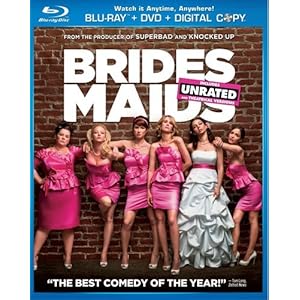
In a lot of ways, Bridesmaids is just a regular comedy produced by Judd Apatow, and that generally seems to be to its benefit. I don't make a habit of watching comedies aimed at women, but a lot of them seem pretty dull in concept and execution. Bridesmaids aims a bit more toward the middle, featuring a mostly female cast, but with a familiar feel to guys who liked movies like Knocked Up, and I think the approach pays off well. I believe it is Apatow's most financially successful film to date, which shows that that kind of wider targeting can pay off. It's a movie about women, but that doesn't have to mean anything negative. The cast is fantastic, and laughs come just as frequently as they ever do in movies like this.
Kristen Wiig co-wrote the film and stars as a woman stuck in a rut with a bad job and a bad quasi-boyfriend played by a very goofy Jon Hamm. Things look up when her best friend played by Maya Rudolph gets engaged (to Tim Heidecker in a marvelously enjoyable non-role) and names her the maid of honor, though they turn sour when she realizes she has competition in the form of Rose Byrne's character, the beautiful wife of the groom's rich boss who clearly wants to step into the role of best friend for Rudolph. The oneupsmanship between the two competitors provides a deep well of humor and awkwardness, and provides the bulk of the tension in the plot. The other bridesmaids are played by Erin from The Office and Johnson from Reno 911!, and I suppose most famously Melissa McCarthy in a role that seems designed to steal the movie but doesn't quite. It's a similar role to Zach Galifianakis' in The Hangover (she even has an oddly symmetrical relationship to the characters getting married), but whereas he was easily the best part of that movie, there's enough good stuff happening constantly in Bridesmaids that no one scene or character really has a chance to do much overshadowing.
So the film plays out about the way you'd expect, with the main conflict damaging the protagonist's friendships and interfering with her own romantic subplot. If I had a complaint about the movie, it's that it's a bit too intense emotionally. The funny moments are very funny, but like most regular comedies, there comes that part in the second act where things get darker and angrier, and the movie goes a bit too far dragging its protagonist through the mud before she inevitably redeems herself. I watch comedies like this to laugh, and while I did that quite a bit during Bridesmaids, the last third was pretty light on the humor. It's a nice story though, and Wiig is a great lead and she's surrounded by terrific supporting performances on all side. It might be the only pure comedy I've actually seen that came out this year, but I doubt it would have a lot of competition for best of 2011 even if I had seen more.
Wednesday, November 30, 2011
Bridesmaids
Tuesday, November 29, 2011
Bored to Death - Season 3

I can't talk about this season of Bored to Death without first mentioning how completely bizarre and messed up the final scene is. I don't want to really say what happens, especially because the whole story of that point was reached is convoluted and the meat of a lot of the season. I'll just say that it involves the main character of this show deciding to do something that is at once dishonest, wrong even if he was being honest about it, and illegal. It was very unsettling, especially since the show seemed to be treating the concept like it was no big deal, just something that might happen in a slightly weirder reality than her own. It just seemed like a big leap to take, and I don't see the value in taking it.
And that messed up finale is just part of why I thought this season was a bit disappointing. When it was working, it was as funny as the show's ever been, with three really great comedic actors playing very well off each other and getting into some truly exciting and amusing capers. The supporting cast featured great guests both returning and new, such as Olympia Dukakis and Stacy Keach. When the show knew what it was doing, it was a heck of a lot of fun. But some of the time it just didn't seem to know what it was doing. Part of what was neat about the show in the first place was how it just played off hardboiled crime stereotypes by taking familiar case concepts and having them get solved by a pretty unlikely detective in the innocent, pleasant Jonathan Ames. That he often got to do so while getting high with a depressed independent comic artist and an eccentric older gentlemen added to the fun.
But that aspect of the show seemed somewhat sidelined this year, as both Zach Galifianakis and Ted Danson seemed to get a lot more to do than Jason Schwartzman despite him being the theoretical character. Danson's performance was definitely off the charts this year, but I like the show more when it's a play on detective stories and not a light-hearted drama about a man trying to come to terms with his selfishness and be a better father and lover. Several story threads lasted for multiple episodes, and there just wasn't enough space for what the show started as in the first place. I'm all for TV series evolving over time, but a lot of the stories weren't interesting enough to displace the core concept as much as they did. It's still a fun show, but there were a lot of small issues this season that got capped off by a major one. The show's ratings are abysmal on Monday night so I don't know if it will be back, but I'm fine either way at this point. I'd like to see more, but 24 episodes is nothing to sneeze at for something this odd.
Monday, November 28, 2011
Hugo

A lot of people were loudly skeptical when they heard that Martin Scorsese would be directing a 3D family movie, but for some reason I wasn't. The main things I thought were that his films are successful because they are well crafted, not because they're violent, and he is a strongly visual director, so he could probably handle the third dimension as well as anyone in the business. Both of these proved to be true when I saw Hugo, based on a book that weaves a small part of the real history of film into a nice story about a young boy who finally makes some friends.
Hugo Cabret is a young orphan who lives in the walls of a Paris train station, and is left to maintain the building's clocks on his own when his drunk uncle skips town. He's also trying to repair a broken automaton that his father found in a museum and was working on before he died, and his quest to do so introduces him to Ben Kingsley's character, the owner of a small toy shop in the station, and his adoptive daughter played by Chloë Moretz, who loves reading but has never seen a movie. He takes her to the theater, and shows her the automaton, and they eventually stumble into revelations that that bring the seemingly disparate elements of a broken robot and the love of film together.
Visually the film is pretty stunning, whether you see it in 3D or 2D, though I saw the former. The sets and costumes are impeccably gorgeous on their own, and the depth from the 3D further brings the world to life in a pretty incredible way. I was definitely more impressed than I was by Avatar. This movie proved to me that the argument that 2D film is inherently superior because it is more dreamlike is absolute garbage. The visuals in this movie make it seem almost like it's animation even though it was filmed with live actors, and they bring you into a fantasy setting that doesn't seem real, but much more imaginative and fun than that. I don't like the over-saturation of 3D in the theater market, because most films aren't made with it in mind and don't seem to really benefit from the process. But Hugo was made to be shown this way, and the effect is great at pulling you into this other place, in the same way that many people probably felt when they watched a movie for the first time.
In a funny way, that 3D thing does really well to tie into the idea of the dawn of filmmaking and the newness of the concept when the film takes place. It's a couple decades after the cinema had become commonplace, but the characters do a good deal of digging into the medium's origins, and a good portion of the running time is just devoted to celebration of the art form. Scorsese is a big proponent of film preservation and film in general, so it makes perfect sense for him to get attached to this concept, almost to the detriment of the main plot of the movie. There were some flaws with the movie that detracted from the overall good feeling I got from the experience. I thought Asa Butterfield's performance was a little uneven, and while I liked Sacha Baron Cohen's inspector character, he only seemed to be in the movie because the story needed an antagonist. I definitely liked him more when he was awkwardly trying to be friendly than when he was the villain rounding up orphans.
And for a family movie, I don't know how much kids would actually like it. A good deal of what's interesting about the film is referential to things they probably wouldn't understand, and it was neither terribly funny not terribly exciting most of the time. There were a couple really fun moments, but what I liked most about the movie was the setting it created, and pretty much every kid's movie is decent enough at that. But if you enjoy Scorsese as a filmmaker, and still have a sense of wonder, and an appreciation for the history of human entertainment, you'll probably like the movie a lot.
Saturday, November 26, 2011
Movie Update 30
Here are some Alfred Hitchcock movies! And a couple others too I guess!
Blackmail

Alfred Hitchcock's first sound film is a pretty decent one. It features a lot of elements that would become his signatures - normal people in great distress, tension building as the result of bad decisions, dramatic climaxes in famous locations. It also seems remarkably dark for the period, with the plot kicking into full gear as the result of murder to avoid a sexual assault. It still feels like a silent movie in some ways, with many scenes going on for ages with little happening, but Hitchcock shows a lot of ability in not just his first attempt at a sound picture, but one of the first ever.
Chicago
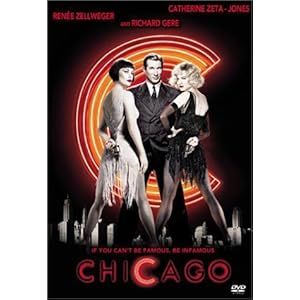
Chicago is a pretty poor choice for Best Picture, not just in its year but probably most. Laughable, even. But it's not a bad movie. I have a feeling the voters wanted to give the award to a musical again, and the most acclaimed one since Cabaret was a decent opportunity. It's actually sort of the opposite of that film stylistically, with most of its musical numbers being fantasies in the protagonist's head rather than regular performances at an actual music club, but that's not really terribly important. The plot is simple and I have no idea why I'm actually supposed to be sympathetic with Renée Zellweger's character, and some of the pieces being a bit simple for the medium of film. But the acting is pretty good and there's an energy to the movie that's enjoyable to watch. Definitely not bad.
Easy Virtue

An even earlier Hitchcock movie, still stuck in the silent era, and unfortunately this one doesn't show a whole lot of skill from the Master. My main problem with the movie is that nothing happens in it. It begins with a woman going through a messy divorce, and then she meets a new man somewhere else, but eventually her past catches up to her. There's nothing really interesting about any of it, the fallout isn't exactly dramatic and the movie doesn't even really seem to care if you're sympathetic or not. All it really seems to be saying is that women shouldn't do inappropriate things if they want to be happy. Which uh... okay?
Foreign Correspondent
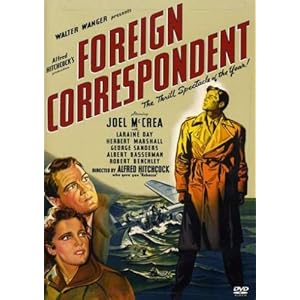
Released the same year as Rebecca, Foreign Correspondent isn't as good, but it's still a solid example of what Hitchcock could pretty much do in his sleep. A reporter gets caught up in a web of spying and secrets that could eventually lead to a World War (paralleling the one that was actually happening), but his ability to tell the truth is compromised when he falls for a girl who's a little too close to the conspiracy. It's one of the weaker American films I've seen by him, but I eventually warmed up to it, especially after its surprisingly exciting climax. It's really more comedic than his work tends to be, maybe because Joel McRea is the lead, and it took me some time to adjust, but it's a fine little international caper.
Rumble Fish

Boy, Francis Ford Coppola's post-70s career is hard to get a bead on. It almost seems like he's a different person. A lot like Tetro, Rumble Fish is a black and white film with splashes of color that partially exists to examine the director's own relationship with his older brother. Matt Dillon plays a young punk who looks up to his brother, played by Mickey Rourke, and who has difficulty finding a way to fit in with the world around him. He hangs out with friends at a pool hall, gets into gang fights, and treats his girlfriend played by Diane Lane like crap. Eventually things start going badly for him, and I can't say I really minded. It's just kind of a weird movie, but some parts worked well enough that I wasn't bored.
Friday, November 25, 2011
Deadhouse Gates

It ended up taking me most of a year to read this book, but that was more because I've been short on free time and reading tends to take a backseat when that happens, and less because I didn't like it. I ended up liking it probably more than the first book in the series, though it again took a while to really get into anything resembling a groove. It features four returning characters, but they only occupy two out of six or so main story threads, with the rest focusing on new faces, and again it's quite a bit of time before most of them seem to start connecting and involving themselves in something that could be called a plot.
It's hard to say whether this struggle early on in the books is a fault of Steven Erikson's writing or if it's just my failure to consistently read them, but usually I can only focus on doing so when I can tell what's happening and am enjoying it. Compared to some other series I've read, The Malazan Book of the Fallen can be pretty obscure. Your eyes can glaze over an entire paragraph if there are too many strange words in it, and if anything really happens in that paragraph, you can struggle with understanding it for a while. But when it works it works really well. I know the series gets weird with its chronology later on, but Deadhouse Gates is a straight sequel to Gardens of the Moon, and it expands on ideas from that book without necessarily requiring you to have just read it. The book uses some pretty dark and violent imagery to effective sell the significance of its events, and at some point it really does get gripping with me reading the last hundred pages in a couple hours. 11 months is definitely too much time to spend on a single book, but I'm prepared to blame that on myself and say I want to continue reading the series.
Monday, November 21, 2011
Call of Duty: Modern Warfare 3
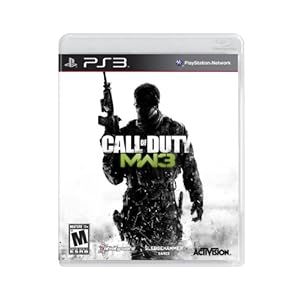
I'm really curious how close this game is to what it would have been had Jason West and Vince Zampella not been fired by Activision and taken a lot of the higher level talent at Infinity Ward with them. Was the plan for the game already in place, or did the people left behind have to come up with the whole thing? If there was a plan, how detailed was it? I'm curious because I had fun with the game, but it doesn't do much besides meet the standards of the previous ones without bringing much new to the table. This is the fifth Call of Duty game in this style in as many years, and both the formula and the graphics engine are feeling a little old at this point. At full capacity, might Infinity Ward have brought their A game and raised modern military shooters to a new level? Or was Modern Warfare 3 always destined to be yet another solid Call of Duty game?
There's nothing really wrong with that, I'm just not sure that I need to play many more of them. Modern Warfare 3 has everything you'd expect and little you wouldn't. There's a campaign that will last you five to six hours which features lots of dramatic explosions and firefights. The Spec-Ops mode returns with plenty of new missions and a survival mode, because every multiplayer shooter needs a survival mode. And there's the traditional online which feels basically the same with a few tweaks and additions. If it's worth it to you, there's nothing really wrong with the package. It's just that it's a very familiar package by now.
One thing in the campaign's favor is that it actually manages to bring the overloaded plot of the Modern Warfare sub-series to a mostly satisfying conclusion, as long as you're okay with the series' practice of resolving story threads by killing off every character involved in them. It seems like shooters are always trying to outdo each other now, and MW3 definitely tries to build that excitement by going as big as possible, essentially portraying what a modern World War III would look like. On one hand you'll be playing alongside familiar characters from the first couple games, chasing down the series' biggest villain, but on the other you'll be hopping all over the place, fighting battles in familiar locations and very extreme conditions. You'll start by saving New York City's harbor from a Russian naval fleet, and then hop to various hotspots all over Europe with your squad of celebrity voice acted comrades. At times the plot justifications for each new location will seem thin, but when all you really want is to shoot bad guys and see exciting stuff happen all around you, it tends to work really well. I don't really buy that Russia would be able to cause this much trouble for the US and Europe all by themselves, but it's an easy thing to let slide. The series' ability to create unique, memorable moments is certainly a boon, as it makes the campaign seem a lot more noteworthy than the one in Battlefield 3, despite featuring similar gameplay and a less technically advanced presentation. The Uncharted series might be the only one that pulls off huge spectacle better in the world of action games.
Not everything is great, though. In what might have been a constraint due to the labor issue surrounding the game's creation, you sure spend an awful lot of time in the campaign driving or riding in vehicles instead of moving on your own. It's not that these sequences are boring, but most shooters use vehicles as a way to occasionally change the pace a bit, and here it seems like a design crutch for when they needed you to kill a lot of guys without finding a more clever way to do it. They did manage to avoid the sort of frustrating choke points that have frequently plagued the series in the past, but instead the game seemed almost too easy on regular, until the final mission which ended up being pretty annoying. You gotta get the bad guy! You only have three minutes! But there's a ton of guys between you and him and they can all shoot you with deadly accuracy the second you leave cover! Go faster! No, slow down and let yourself heal! There are better ways to make a conclusion dramatic than the way they handled it. It seemed odd that some of the biggest twists in the story involved a new character that we didn't have time to really learn much about, and it's hard to be shocked by anything the series does anymore. In the past the series has effectively used the deaths of characters to create memorable moments, but when you get the point where you basically assume everyone is a goner, it stops seeming special.
Also, I'll be honest - I haven't tried the other modes. Battlefield's larger, objective-based multiplayer is more interesting to me, and most of my time is being taken up by other games anyway. Some of the things they've added like ways to get bonuses in multiplayer without being skilled enough to earn a kill streak seem neat, and Spec-Ops was pretty fun from what I played before. I know some people only care about Call of Duty for the online, but I bought it because I wanted to see the end of the Modern Warfare story, and I'm pretty sure I got that. It wasn't exactly a unique or inspirational game, but it was a fun one, packing plenty of interesting moments and enjoyable gunfights into the amount of time it lasted. I'd like to see the series do something really different before I try picking it up again, but it's hard to complain about this as a temporary send-off.
Sunday, November 20, 2011
Robot Chicken - Season 5

I guess this was the year I got tired of Robot Chicken. This season won't finish airing until early next year, but the whole thing is already on DVD, and I rented it on Netflix so I know what's up. And yeah... I was watching it, and waiting for it to make me laugh, and it just didn't really happen. There's a few things about the show that have always been abrasive, and gotten in the way of what works about it. It relies on violence an awful lot, and that seemed particularly true this year, with many sketches lacking any real punchlines at all, resorting to just going through various action/thriller/horror cliches with out of place characters in hopes that the novelty would be enough. But it's not really novel anymore. There have been 100 episodes of this, and I'm not even counting the Star Wars specials. A lot of the other humor is just unusual swearing that never seems particularly memorable, or typical gross-out stuff. In the past the show has been clever when the writers really tried, but I'm not really seeing that effort anymore. And the frat mentality is there more than ever. One thing I did like was the season finale, which actually turned the intro featuring a cyborg chicken and his malevolent creator into a story, but even that couldn't avoid certain issues. Seriously, if I have to hear one more "my one weakness!" joke any time soon, I'm gonna flip out. I don't know if they plan on bringing the show back, but if they do, I don't think I'll be making sure to catch it every time a new episode's on.
Saturday, November 19, 2011
Rango
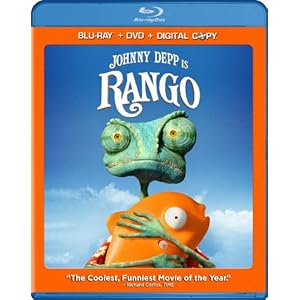
I had heard that Rango was a good animated movie for people besides little kids, but I didn't expect to like it as much as I did. It's probably the best non-Pixar American animated movie I've seen since The Iron Giant, which is a lot of qualifications, but it's still a solid accomplishment. It's definitely not a movie designed to appeal directly to children; I'm sure plenty would like it, but the story and characters have enough maturity and older-skewing references built into them to make it probably appeal more directly to someone with at least more knowledge of the history of film. There's a lot of Western character archetypes and homages to a bunch of different sources, the stuff that's supposed to be fun for parents who brought their kid to the theater. It goes beyond that here, though. The whole movie seems more designed with the parent in mind than the kid.
Again, not that I don't think kids would like it at all. It's a pretty silly movie in places, and not very difficult to follow. I just thought it was aimed at me more than I expected it to be. The cast is pretty outstanding and varied, with the right idea being used when the voices were picked - they do use celebrities you've heard of, but they're cast to play characters, not to be famous and recognizable. I know Johnny Depp at least was moving around on a set to help create the character, and his Rango is pretty loveable. He's a pet iguana who ends up stranded in the desert and meets up with a small community of wild animals who are struggling to find water. There's a love interest played by Isla Fisher, and a cute little girl played by Abigail Breslin, and a wise but suspicious authority figure played by Ned Beatty. It could pretty much have been a live action Western with the same general characters and worked the same, and that's what's interesting about it. The animation enhances the movie though, providing great opportunities for little moments of humor and some pretty spectacular action sequences. There's just something about complete freedom and control of moments of excitement that really brings out the potential of the form. It's kind of a simple and predictable story, but it works because of the solid humor and charming cast. I certainly wouldn't mind seeing it dethroning Pixar in the Best Animated Feature race early next year.
Thursday, November 17, 2011
South Park - Season 15
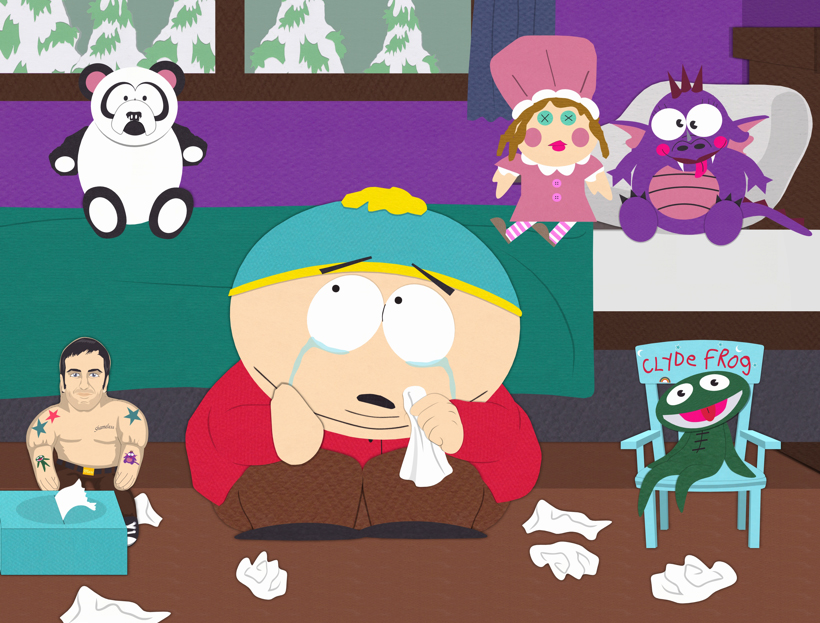
I'm at a crossroads with South Park, as I am with a number of other shows. It used to be I could just pick a show I'm interested in and watch every single episode, but now that I'm working full time it's harder to justify that. There has to be something more to keep me watching, or else I might have to stop watching a show before it actually ends its run on television. I've already done it a few times, and I'm sure I'll do it again. It doesn't take a lot for a show to stay in my rotation - all it has to do is be consistently very entertaining, or compel me to stay interested in its plot or characters. South Park does very little in the way of ongoing character development or story elements, so it has to rely on the former, and I'm not sure South Park does that. With the news that the show will continue to keep running through at least 2016, should I keep watching, or should I stop while I'm ahead and be glad to have gotten 15 mostly enjoyable years out of it?
The problem with the show now is that in its heyday, South Park was special because it was shocking and original. Both of which are hard to maintain after being on the air for over a decade. It's not that the show is afraid to tackle delicate current events, now - it was pretty much expected for them to react to the Penn State scandal, and they did so last night with a character who constantly cracked inappropriate jokes about it. It's just we're so used to their lampooning of pop culture what's in the news that it's not really fresh anymore. It eventually falls to our affection for the characters to keep us watching, and they're still an entertaining group, and there were actually a few episodes that teased at doing something different with them, like the cliffhanger where Stan's parents separate (again) or the one where Cartman has to move on from his doll collection. But while I enjoyed most of this season's episodes, I'm not sure if I still care enough to keep watching, especially when I know there definitely isn't any sort of end goal in sight. It's not like it's a terrible sacrifice to give up a half hour on fourteen Wednesday nights every year though, so I guess we'll see how I feel later on.
Tuesday, November 15, 2011
Squidbillies - Season 6

Another year goes by, and Squidbillies trucks along as strong as ever. It's hard to really compare different seasons of the show, because the division is meaningless. A new season just means another batch of episodes, and each episode is pretty much the same concept. Early will be an asshole, the people around him will be hurt because of it, and there will be some slight satire of certain cultural or political concepts involving the south. It's a basic formula, and it works because it's consistently funny and that's all it has to be. I'm coming to appreciate how good of a character Early is - he's possibly the most despicable television protagonist there is, hateful and ignorant and moronic and violent. And yet he's just so damn amusing that you love him anyway. It's partly the writing, which always finds new twists on some combination of those characteristics, and it's partly Unknown Hinson's consistently brilliant voice acting. I don't think there's a sentence in the English language he couldn't at least make partly amusing if he wanted to.
This was also a good season for the sheriff, although most of them probably are, because he tends to get the most good material besides Early and maybe Rusty. Granny definitely gets a lot more jokes, but they're usually pretty easy ones based on stuff we already know about her, while the sheriff's always optimistic take on things seems fresher for some reason. There's nothing much I particularly want to point out, other than this Sunday's season finale about transporting illicit cargo with high speed truck chases might have made me laugh out loud more than any other episode of the show, which I find consistently entertaining but rarely elicits actual chuckles for me. Mostly I just smile at the wordplay and cleverly deployed violence. For what it's worth, Squidbillies has been the better of the two shows that David Willis works on for a couple years now. It's a similar situation to Seth MacFarlane's Family Guy and American Dad! - the former is more popular with America and is maybe saddled with certain expectations, while the latter is able to do its own thing and is much more consistently funny for it. Squidbillies is not anything close to a world changing show, but it's a really enjoyable one, and that can be enough.
Monday, November 14, 2011
Movie Update 29
Well, here we are again.
The Castle of Cagliostro
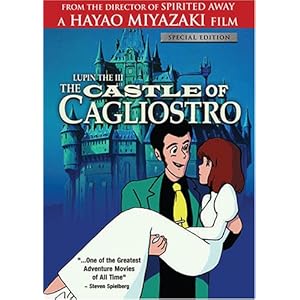
Hayao Miyazaki's first film as a director, before Studio Ghibli was a thing, is based on the Lupin III television series he worked on, which was based on a manga created by Monkey Punch, which was inspired by the Arsène Lupin character created by Maurice LeBlanc. The film's plot is also based on one of the original Lupin stories. So yeah, there's a lot of adapting going on here. Cagliostro is a lighthearted action adventure about Lupin and his buddies stumbling on the world's biggest counterfeit currency operation in one of its smallest countries, and trying to both thwart their plans and rescue a princess at the same time. I've only seen a bit of the show, but it doesn't take much of that to get familiar with the principal characters, and they all show up here and have fun little parts to play. It's a simple movie, but there's a nice energy to it, a reasonable amount of excitement in the twists and turns, and like all works by Miyazaki there's a nice feeling to the animation, which isn't the most fluid ever but does what's required to set the right tone. It's kind of a standard adventure movie, but it's a well executed one.
Killer's Kiss

Not Stanley Kubrick's first feature film, but the first that's readily available for public consumption. It's also his weakest that I've seen. There's nothing very bad about the movie, but there's just not much to it. A boxer meets up with a dancing girl, and they try to leave the city and start a life somewhere, but her crook of a boss isn't a fan of the idea. It's a pretty bare-bones noir story, with the only thing that really makes it work being Kubrick's great photography. There's lots of great little shots that stick out as distinct for the era, including use of reflections, some stuff with shadows that I haven't really seen before, and a memorable conclusion in an unusual setting. There's not much to the characters though, and the tacked-on ending doesn't really work. Its only real use is to show the potential Kubrick had for his work later on.
The Killing
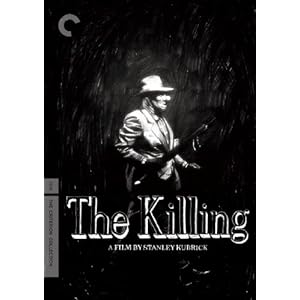
The very next year Kubrick made this, his first really good movie. It actually feels a bit less distinctly his than Kiss, but it's certainly a lot more fun to watch, and might actually be the most purely enjoyable movie he ever made. In one of the few instances I can think of of him using an actor more than once, he has Sterling Hayden as the main character, a criminal trying to pull off one last job, robbing the take at a horse track, with a complicated scheme that involves multiple people both inside and outside the place. It's a pretty good plan, though there's also a lot of moving parts, and of course things get screwed up and the situation eventually gets pretty hairy. There's a lot of build up, and the pay off when it all starts falling into place is pretty great. Stylistically, there's not much in the movie that wouldn't be in another noir movie from the period. But it's also just a really good example of the genre, and sometimes that's all you need to be successful.
The Tree of Life
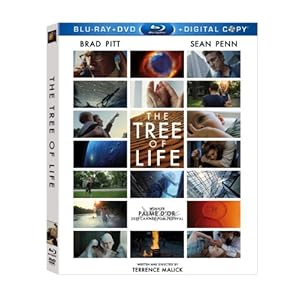
This is a film about life, and growing up, and pretty much everything that entails. I said before that I imagine a film by Terrence Malick entirely in his reflective/observing-nature's-beauty mode might get tedious, and that's somewhat true here, but the film is so beautiful and poignant that it's hard to be really bothered by the slow bits. The film isn't exactly in chronological order, but what it's basically about is Sean Penn remembering his youth growing up with his parents and two brothers, and also experiencing some sort of vision of the birth of the universe and what possibly lies beyond it. It's a staggeringly gorgeous movie at times, especially in the scenes showing the early moments of existence, with visuals that avoid computer animation in favor of more natural means. The more normal stuff looks great too, though it's mostly just people walking through houses or the woods. Brad Pitt plays his father, and does a really great job making him into a terrible dad that should really be feared and despised without being over the top about it. Just the way he touches his sons on the neck is enough to establish that loving parenting doesn't come naturally to him. I don't think the movie needed a name like Penn to play the adult version of the main character though - he doesn't really do much acting besides walking around and looking at things. The Tree of Life is a bit ponderous and in love with itself at times, but what it does right is memorable and unique enough to make the film worth watching, especially if you're a fan of film as a visually artistic medium.
Sunday, November 13, 2011
Hanna
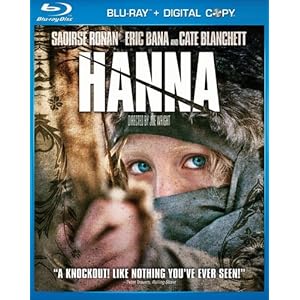
I enjoyed Hanna, but it was a film that relied on its style alone more than almost any I've seen in a long time. Director Joe Wright is known for his serious period dramas, but Hanna is very different. It's an action movie; a revenge thriller where the protagonists are always on the run and trying to get back at the person who wronged them years ago. Eric Bana is a former CIA operative who has been raising his daughter played by Saoirse Ronan in the woods, and training her her whole life for one mission, to kill a woman from the same organization responsible for her mother's death. Hanna is not only a very adept hunter and fighter, she's also unusually strong for her age and fluent in many languages. The secretive nature of her past and larger-than-life skill set hint toward the inevitable plot revelations, ones I won't spoil here but which are pretty easily guessed at and honestly not kept all that secret.
I think if I played fewer video games, I might have enjoyed the story of Hanna more. But as it is, the concepts it deals with are very familiar to anyone who's spent some amount of time with the kind of outlandish stories that games trade in, or just pulpy genre fiction in general. The craft with which the film is made doesn't discount the familiarity of what it's doing. I also wasn't really thrilled by the subplot where Hanna learns what life outside the forest is like and comes to regret her upbringing, which is another idea that's very familiar and is hard to make interesting anymore. Also, while Bana and Ronan are both good in the movie, I really didn't like Cate Blanchett's work as the villain. The American accent she put on was pretty terrible, and the character in general wasn't as interesting as the movie wanted her to be.
Where the movie succeeds though is definitely in the presentation. Wright definitely has a handle on action, creating some memorable sequences that don't rely on super fast cutting to be exciting, and he knows what he's doing in the personal scenes as well. Two moments that definitely stood out were a pair of long takes that were gripping for their entire duration, even though I'm sure I spotted where a cut was masked in one of them. Apparently they're a trademark of his, and while most people can hold a camera in one place for a while or even move it through a crowd, it takes a lot of effort to shoot scenes like this in that style. It definitely reminded me of Children of Men, even though they weren't quite that impressive. Elsewhere, I generally liked the look of the film, even if the use of color was a bit over the top and places, and the score by The Chemical Brothers was as interesting as promised. Hanna is certainly a flawed movie, but it's a unique one, certainly worth a watch if you like to see a different take on the action genre.
Saturday, November 12, 2011
The Heart, She Holler
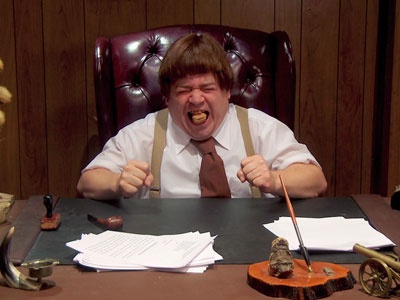
Well, that was pretty great.
The Heart, She Holler was a six episode miniseries on Adult Swim, created by PFFR, the same people who brought us Xavier: Renegade Angel and Wonder Showzen. So two things about it were pretty much be guaranteed: it would be totally disturbing, and pretty damn funny. And Holler was definitely both. It begins when the head of the Heartshe family, rulers of the town Heartshe Holler, dies, and leaves his inheritance to his son, who he had previously kept secret, hidden in a cave behind a wall. That son is played by Patton Oswalt, and after he learns how to dress and say "hot dog" and gets his penis swapped with his father's through a misunderstanding, tries to run the town while coping with his own insecurities and the meddling of his power hungry sisters; one who can read minds and has other mysterious powers, and another played by Kristen Schaal who will sleep with anything that movies and his pretty impressive physical strength.
That that summary only begins to describe the insanity of The Heart, She Holler should say plenty. There's plenty of gross moments, including repeated references to incest and bizarre imagery like a wall socket being connected to some sort of intestine, but the show doesn't just rely on shock value to get laughs. It's mostly a bunch of insane rambling, but it's clever insane rambling, and running jokes like the former patriarch's seemingly infinite supply of instructive video will VHS tapes and the tons of jabs at religion and insular southern towns keep it from relying on disgust to drive the story. The whole thing barely lasts over an hour, and by the end I was wishing there was more to see, especially because of the distinct lack of closure in the ending, even though describing what came before as a plot would be very generous. It's well cast, funny, and just has the right amount of horror to definitely be a PFFR creation. If you're really into alt comedy, it's definitely worth seeing.
Wednesday, November 9, 2011
X-Men: First Class
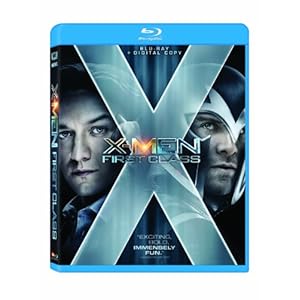
When you think about it, this was a pretty remarkable year for films based on Marvel comics. No real classics, but they effectively build up The Avengers for next year, and they managed to put out three films without any of them stinking, or even being less than pretty good for summer action blockbusters. X-Men: First Class might be my favorite of the three, not just looking at the whole X mythology in an interesting way, but being the second best X movie that's ever been released.
At this point, the whole continuity of the X movie franchise is pretty messed up. The Wolverine movie probably did the most damage, but the whole thing is fraught with issues arising from recasting and changing things that needed to be changed. As a way of pushing a big reset button, First Class mostly works while still acknowledging what's been done before for the most part. It shows the early lives of Professor X and Magneto, depicts them becoming friends during a conflict that alerts major governments to the existence of mutants, and sets the stage for their antagonistic relationship that defines the rest of the series. It doesn't do all this perfectly, but it gets the job done, and considering how little time Matthew Vaughn and his cast and crew had to put it together, I think it's fairly impressive work.
The best part of the movie is very easily the development of Erik and Charles as characters and as friends, and it's what the whole movie builds from. James McAvoy and Michael Fassbender both give very good performances, especially considering it's a comic book movie, and there's a real camaraderie that builds and a sadness when their relationship inevitably turns sour. The other stuff isn't as good, but it isn't too bad either. Kevin Bacon and January Jones play Sebastian Shaw and Emma Frost, the leaders of the Hellfire Club, are the main villains who want to start a nuclear war and create a paradise for mutants in the aftermath. Tying the main external conflict of the film into the Cuban Missile Crisis is a pretty clever move, and it works to ground the story in a period of history and play around with what we already know. There's not much else to the plot that isn't maneuvering to get characters in place for where they should be later, but there doesn't really need to be.
A good deal of time is spent with the main characters working with some members of the CIA to essentially create an early version of Xavier's school for mutants, with some familiar faces and characters new to the movies both getting introduced. One of the best single moments in the film comes from the recruitment montage, where Charles and Erik find a certain popular X-Man and get a rude response from. Otherwise, the whole training and preparing thing kind of slowed down the movie a bit, and none of the new mutants or their little subplots were particularly interesting. In general, the script definitely feels a bit thrown together, with a climax that goes on for a while but doesn't always have a clear purpose, and a few silly bits that took me out of the story. But as I said, the central story of Xavier and Magneto definitely works, and resulted in a pretty good movie. I'm definitely more interested in more of this than another Wolverine movie.
Tuesday, November 8, 2011
Battlefield 3
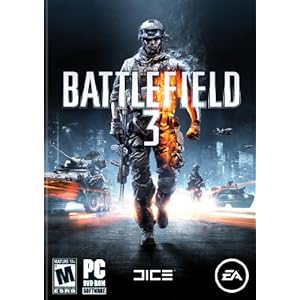
Since Battlefield 2 was released in 2005, the series has seen plenty of games get released, but it is only now that we're getting a new numbered one. Battlefield 3 seems to be both a return to the series' roots, and also a culmination of the changes it's gone through since 2 came out. It combines a lot of the strengths of the original games with some of the improvements by offshoots like Battlefield: Bad Comapny, resulting in a product that seems like the end result of years of tweaking and experimenting, and is being positioned and marketed to take on big bad Call of Duty for leadership in the modern military shooter market. I don't think 3 will do better than its competition, but at least it's a pretty fun game.
Originally, Battlefield was all about online multiplayer, allowing up to 64 players to split up into teams and take each other on in huge maps filled with a variety of outdoor locations, peppered with various structures for hiding in and vehicles to drive. The first game took place during World War II, but the second main release brought things to the modern day and added in squads, which allowed for closer teamwork and a more direct sense of having a goal in these gigantic marathon battles. The online in 3 is pretty much like this, though they've taken a number of additions from the Bad Company games like more frequent and incremental unlocks rather than getting a new weapon every once in a while, and the Rush mode which can be a nice breather from Conquest. The game feels more up-to-date than Battlefield 2, with some streamlining in effect like the removal of a commander for each army and the paring down of the number of available classes, and a more rewarding progress system without any of the annoyances of other popular contemporary features like kill streaks that unfairly reward players that are already better. Yes, players who have played for a long time are going to have better guns, but it doesn't seem significant enough to really impact gameplay.
I haven't sunk more than a few hours into the multiplayer, but it definitely seems to live up to the legacy its predecessors cemented in my mind of being one of the most fun online shooters on the market. Some technical issues still need to be worked out, but the Battlelog web browser is a quick way to look up stats and other players, customize your options, and find matches, and the actual in-game stuff runs pretty well. If there's one thing that might impede the gameplay slightly, it's actually the quality of the graphics. On one hand they're very impressive, but on the other I'm wondering if the fidelity of the animations and lighting actually prevents me from spotting and taking on opponents in a timely manner. It's possible I just continue to suck at games, but more than once I felt that I would have been better served if the environment around the enemy wasn't so nice looking. There's also a co-op mode, which I haven't tried yet. It seems to remix encounters from the single player campaign, but I don't know how interested I am in that when the regular online is so consistently engaging.
Speaking of the single player, those graphics might be their greatest asset. Whatever flaws the story mode might have, at least it looks really nice while you're experiencing it. I can't really recall an experience that convinced me better that I was actually in a war zone, and it would have been better if I wasn't constantly staring at the back of someone else's head with the word "follow" written over it. From what I can tell, I might be one of the only people who really enjoyed the campaign at all. Its one cardinal sin in my mind is that it almost entire fails to take advantage of the fact that it's the campaign for a Battlefield game. For all their faults, the Bad Company campaigns felt like they belonged in the world of Battlefield. Encounters took place in relatively open areas, and could play out in a number of ways. You frequently had full control of vehicles and a couple decisions to make about how approach a situation. Battlefield 3's campaign plays like a Call of Duty campaign almost exactly. There are no sections with respawning enemies, but you're generally led from set piece to set piece, watching some cool things happen, taking part in relatively static battles, and once in a while getting to use a vehicle to experience something slightly different, but only in one mission do you really feel like you have much control. It's not that any of the missions were spectacularly bad, I just don't see how they benefited from taking this course of action. There were even specific dramatic story moments that felt extremely similar to moments from past Call of Duty games. I generally had fun playing the campaign, but there was something ultimately disappointing about it. And if DICE doesn't actually make a sequel to Mirror's Edge with this engine like they were clearly teasing at a certain point, I'll be kind of upset.
How you feel about Battlefield 3 sort of depends on what you want out of it. The campaign seemed to lack a certain something for most people, and if you were hoping for it to be something special you might be let down. But Battlefield has always been a series with a focus on multiplayer, and I know plenty of people will dive into that without even taking a single look at the single player. And I think from my experience with the online, it's certainly a worthy follow-up to Battlefield 2, maybe not overhauling the experience but refining it and making sure not to ruin it. As someone who enjoys a solid six hours of action and thinks the series does online firefights as well as any, Battlefield 3 isn't exactly a revelatory experience, but it's definitely one that I think was worth the investment. Even if having to download Origin to do so was kind of annoying.
Monday, November 7, 2011
Evangelion: 2.0 You Can (Not) Advance

I would have seen this sooner, but I'm no longer in the habit of paying for DVDs of movies I haven't actually seen yet and Netflix took their sweet time making it available for rental. The second part of Hideaki Anno's theatrical retelling of the Evangelion story satisfied me more than the first, covering more of the original series' plot and doing so in a less easily predictable way. There were some slight differences between the events of the first movie and the handful of episodes it covered, but they generally weren't significant enough to pay much attention too. They really took strides towards their promise of doing something different with You Can (Not) Advance though, introducing new characters, shuffling around their appearances, and changing certain memorable events in significant enough ways to produce even more major changes down the road. It's often just the little things, but the twists they add in make the project seem worthwhile rather than just a way to cash in on the franchise's large number of fans.
If you don't already like Evangelion, I don't think anything about this movie will change your mind. It's definitely made for people who already know what the story is about. There's a certain feel to the proceedings that make them a bit esoteric, where it's much easier to follow what's going on if you've already seen the several hours of episodes that the less-than two hour film summarizes. It results in a film that's a lot of fun for certain people, but probably wouldn't play to a larger audience very well. Personally, it's hard to be bothered too much by that - I'm aware that the structure of the story doesn't fit the traditionally acceptable mold for a feature film, but I also don't care so much because it's really interesting to see these familiar events play out in a slightly altered way and with significantly higher production values. The animation and art design in general on these films is top notch, and with the right appreciation for the medium you might get something out of them even if you have no idea what's going on otherwise. The frequent fan-service is a distraction, but not enough to keep the movie from being the most enjoyable animated film I've seen in a little while. I know it's going to be another long wait before we get the last two movies, but I guess I can live with that.
Sunday, November 6, 2011
Uncharted 3: Drake's Deception
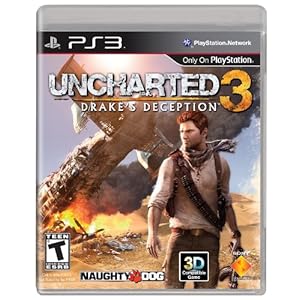
Uncharted: Drake's Fortune managed to successfully blend together third person shooting and traversal-based platforming into something that was coherent and mostly fun to play, but it was the kind of thing where most people saw it as untapped potential. That potential was pretty much fully exploited in Uncharted 2: Among Thieves, which greatly improved the graphics, environmental sophistication, dynamism of the plot, and basically everything about the gameplay to be better, creating a unique and exciting shooter that could pull off large, spectacular events like few games even attempt. Really only the God of War series goes for the same concept of the environment changing around you like Uncharted does. It allows its shooting mechanics, which are a bit less solidly formed than some other games, to pass by without too much scrutiny, and makes just seeing what happens next as thrilling as actually playing the game. Uncharted 3 had a different goal - not to capitalize on potential, but to live up to a beloved classic. It's a goal that the game mostly succeeds at, though not without a couple bumps.
For better or worse, Drake's Deception is pretty much a second take on the same concept as the second game - let you play as a guy who trots all over the world, looking for clues, crossing dangerous gaps, shooting every bad guy in sight, and escaping from very dangerous and exciting predicaments. The story has a slightly different focus, feeling like the slightly darker sequel that series sometimes experience, but never veering too far from the lighthearted adventure tone we've gotten used to. A lot more time is spent developing the friendship between Nate and his mentor Sully, instead of leaning towards his romantic interests. It's just as well, since that part of the story plays out in pretty much the same way it did in the first two games. The plot even goes back in time on occasion, to show a much younger Nate, which provides a neat gameplay twist and some illuminating character development. The villain is also different this time, relying less on trying to beat Nate into submission and more on deceiving and outsmarting him. The cat and mouse is fun, though it falls by the sideline after a while.
In general, the last third of the game feels a bit rushed. It takes a more personal approach, showing the hardships and isolation he goes through, something we aren't really used to with this series, and I kind of missed the fun of him having his buddies around. It also results in the ending being undercooked, as we don't really fully learn what the villains are really up to or the meaning of certain plot elements. It's a bit disappointing to feel that way about the end of the game, but the benefit of the game not wearing out its welcome balances it out a bit. In the first two games I was definitely tired of the combat by the last couple chapters and ready for it to be over. That wasn't really the case here, as Uncharted 3, while having a couple annoying moments like every shooter ever made, managed to finish without it become a major burden. The changes to the gameplay from the second game are mostly small tweaks - Nate can now throw back grenades enemies toss at him, and it's less of a hassle to pick up ammo, and in general the encounters do a slightly better job of creating unique scenarios that play to the series' strengths. The platforming and puzzle solving are pretty much the same as they've always been - not too tough, but engaging enough that you look forward to them when they pop up. The game doesn't have any annoying forced stealth sections, which is nice, and they improved on the melee combat, occasionally making you take on groups, letting you worry about guys coming from multiples directions and make use of objects near you for more damaging blows.
And technically, the game is just outstanding. Even when things aren't going crazy, they look amazing. The textures and lighting are fantastic, Drake's dynamic running animations are more natural than ever, and the facial animations look better than ever. And when things do crazy, it's always impressive and memorable. Floating docks and boats rocking in the waves, entire structures turning sideways as you run through them, the ground collapsing underneath you, the plan sequence that it's unfortunately impossible to be spoiled on - these sequences both look incredible and provide gameplay experiences that other games just don't have. Fundamentally, there's not a big difference between climbing a fence and climbing the netting of a cargo truck hanging out the back of a plane, but just the feeling each one evokes is distinctly different. It's just a fun world to run around in, one made more fun by the memorable musical score and great voice acting by the familiar cast, which continues to grow and help create a very enjoyable story.
The single player is a great eight hour experience, that in my mind measures up to the general very high level of quality of the second game, and surpassing it in someways. The multiplayer is also a lot of fun, and helps extend the life of the game. I played through the entire co-op adventure mode with a friend, which was a nice, rewarding challenge, and also tried some other co-op stuff which was a good deal of fun. I didn't actually try any of the competitive stuff, but that stuff never interests me as much anyway. Uncharted 2 will probably be remembered better in the future for being new and original, but Uncharted 3 definitely deserves a spot alongside it as one of this generation of gaming's best action adventures.
Saturday, November 5, 2011
Movie Update 28
These are some pretty runty-ass movies! They weren't bad, though.
The Good German

I've only seen two films by Steven Soderbergh, which both happened to be very populist and not terribly original. But he's known as a very experimental filmmaker, at least by Hollywood standards, and even if you don't like The Good German very much, you have to admit it's ambitious. I ended up enjoying its modern day take on lots of old noir tropes, but more interesting than the film itself is the way it is dedicated to the style of the period. It's in black and white, and more than that the way it was filmed is very much the traditional old way, with old cutting and old blocking and everything. It doesn't really actually look like it was made in the 40s, because of the lighting, and because of the weird disconnect with the very modern standards of sex, violence, and language. I don't understand the point of going this far with replicating a look without replicating a tone as well. But you can't say the whole thing isn't interesting. And I think George Clooney and Cate Blanchett make a good pair on-screen, anyway.
The Red Badge of Courage

A war film by John Huston, based on a book about a soldier in the Civil War who fears death and yet yearns to earn his own war wounds and be looked well upon by others. It's an odd movie for a couple of reasons, most notably the incredibly on-the-nose narration, which not only directly quotes the original novel but also addresses the audience in a weird, hitting-you-over-the-head kind of way. It definitely wasn't surprising that this was added by the studio against Huston's wishes, and that they also cut the film down to its scant 70 minute running time, which is hardly enough time to develop themes, especially when so much of that time is just Huston's (admittedly well shot) war scenes. There's the potential for a great 50s war movie in here, but it was lost between filming and release.
Tetro

Francis Ford Coppola's post-70s career is frustrating, showing little evidence that a man who could create a film as perfect as The Godfather still knows what he is doing. Tetro is interesting though, a more personal project than most of his other work, about a couple of estranged brothers who reunite in Spain. It's shown in black and white except for flashbacks, and shows the devastating effect certain actions can have on family ties. It's not exactly the most entertaining movie ever, but there's definitely some stuff going on here that you don't really see in most other movies. It's also really nice to look at, with some stylistic experiments and just really good cinematography throughout. Definitely the best thing I've seen by him that was released in the last 30 years.
Thor: Tales of Asgard
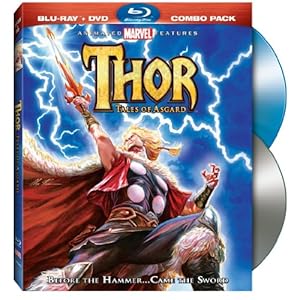
That cover is misleading; it shows a grown up Thor, but the film takes place in his more formative years, before Loki was evil, and before Odin even allowed him to venture out of Asgard. At least they didn't extend the lie far enough to show him holding the hammer. Tales of Asgard isn't much different from the other Marvel movies, being competently animated and telling a pretty standard story, although being Thor, it's less a typical sci-fi action plot and more a typical fantasy one. Thor goes on a journey with Loki, hangs with the warriors three, gets help from Sif, and accidentally gets into some bad shit with the frost giants. As a supplement to the live action film... it's fine. There's nothing terribly exciting about it, but it doesn't really mess up anywhere either. It's a way to pass 70 minutes if you like comic books, I guess.
Thursday, November 3, 2011
Source Code
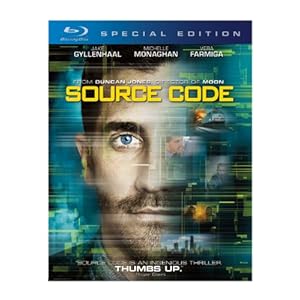
Duncan Jones is now two for two with science fiction films that are well made and visually appealing, have intriguing concepts, and are entertaining to watch reach their conclusions. Although Jake Gyllenhaal's central performance isn't as gripping as Sam Rockwell's in Moon, which pretty much had to carry the entire film, he's good enough to lead a film that I otherwise thought was a little better in most other areas. When I first saw the trailer for Source Code, it seemed like a silly idea. They seemed to be depicting the main idea as a simulation of the last eight minutes of a train ride before it blew up, not actually altering events but observing them to figure out what happened. Gyllenhall's inability to grasp the concept of being unable to save the already-dead victims made him seem dull. It works a lot better in the actual film, when they lay out that he's actually being repeatedly projected into an alternate universe that the source code creates, rather than basically just watching a static event over and over again. Some bits that don't quite make sense are hand-waved away with simple catchphrases like "genetic mapping" or whatever, and they don't really go into how these parallel realities are actually created. But it's not hard science fiction, and as a way to set up a twisty, exciting thriller, it's more than enough.
I really liked Gyllenhaal's character, a military helicopter pilot who wrestles with trying to grasp the situation he's in, helping with the mission he's been given to help prevent a larger attack, and striving to find a way to save the train passengers, especially the girl played by Michelle Monaghan that he sits across from. She doesn't have a lot to work with, being stuck in the same eight minutes of plot as along with the other passengers, but she's cute and likable and pretty easy for Jake to fall for. His attraction contributes to his larger attempt to do more than just solve the attack, something which his handlers tell him he can't do but you become unsure of over time. Vera Farmiga plays his main contact in the real world, an operator who has to balance her duty with her obvious sympathy for his situation, and does a nice job with it. I was less pleased with Jeffrey Wright as the creator of the source code project, who is a bit too obviously evil and uses an odd gravelly voice, but he doesn't damage the film much. The plot has the expected twists and turns, and resolves in a way I quite liked examining angles of the concept in ways I wasn't expecting, and bringing the different story elements to a united conclusion. There's lots of really good imagery in the movie, stuff that seems simple but helps add up to the sort of movie that could have been a lot weaker, but manages to capitalize on its potential quite well. It's too bad that Jones says he only wants to make one more science fiction movie before stopping for a while, because he seems to have a real knack for pulling it off.
Tuesday, November 1, 2011
Resident Evil 5
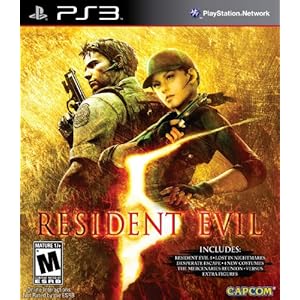
It's not really a surprise that Resident Evil 5 is not as good as Resident Evil 4. It's not an insult to say that either, because the latter is one of the best games to come out in the last decade. 5 takes the core gameplay and design philosophy from 4, and expands on it in a new setting in some ways that are interesting, and in other ways that will leave you scratching your head. It's probably a more ambitious game, but on occasion its reach exceeds its grasp. When it's just following up on what 4 did right, it's a perfectly serviceable action game. It gets sketchy in other places, but at least it never goes completely off the rails.
The biggest change to the series is pretty obvious; the entire game is designed to be played with two people. The first player controls Chris Redfield, a recurring hero of the franchise who's worked out quite a bit since the last time he was seen. The second player controls Sheva, his lithe but functionally identical partner during his mission in Africa, where a nefarious biological arms deal is going down. They support each other through the entire game; healing each other, saving each other from danger, sharing equipment, and working together to get past certain obstacles. Even if you're playing alone, Sheva will still be there, controlled by the AI. This is the way I played the game, as more than two years after the game came out I didn't like the odds of finding a reliable co-op partner on the PS3. For the most part, the single player mode works just fine. Sheva stays out of danger reasonably well and isn't overly wasteful with her ammo. There are some situations though where she's kind of a millstone, notably when it would be best for no one to use any bullets at all or when the correct strategy is to attack an enemy from two directions at once. And unfortunately, these situations seem to pop up more frequently as you continue through the story. I was genuinely annoyed by the execution of the one player mode on a couple occasions before I managed to get to the end. All things considered though, it could have easily been worse.
Besides the two protagonists, it's more or less more of Resident Evil 4. You work your way through African villages and swamplands, eventually reaching more unexpected areas and the inevitable top secret research laboratory near the end. I never really stopped to think too much about the whole race thing. It is a bit odd to be playing a game about shooting a bunch of African civilians, though to be fair they're fairly racially diverse and trying to kill you. There were definitely some weird choices that seemed to be the result of ignorance or insensitivity though, especially involving the more natively tribal enemies you eventually run across. Just looking at it as an action game about fighting zombie-like monsters though, as well as their many amorphous and/or insect-like allies, it does a pretty good job of keeping things fresh and reasonably challenging without getting too frustrating. I became less happy with the general design as things went on, though. A chapter taking place in an underground temple was interesting in theory but not especially well executed, and later they implemented some pretty sloppy cover mechanics and poorly thought out boss fights that the controls didn't really support. When you're just trying to stay out of arms reach of disorganized, mindless hordes, Resident Evil 5's controls are fine. When you have to worry about guys firing guns and coming at you from multiple directions though, it gets dicey. It's never too bad to stop the game dead, but it probably wasn't the best direction to take the second half of the game.
As far as bringing Resident Evil to the current generation, I think they did a good job. The graphics still look nice now, with some really good character modeling and animation, especially on the main characters. The sounds are very familiar if you've played 4, and still work effectively. The voice acting also is a bit less terrible than series fans are used too, though some characters are just wretched in that way where you can't tell if they were serious or not. The story attempts to connect the Las Plagas plot from 4 with the Umbrella and Wesker stuff that came earlier in the series, and does a reasonable job of doing so, though honestly the entire history of the series' fiction is some pretty silly, stupid stuff. It's a weird pastiche of supernatural and science and horror and action, and while I kind of enjoy the absurdity of it all, I would hesitate to believe anyone who claimed to know whether this was actually going anywhere or care that it did. It's flimsy justification to have a game where a couple of special forces guys fight zombies on motorcycles, giant pulsating piles of tentacles, and guys in trench coats who look like they walked off the set of The Matrix. And that's all it really needs to be. The Gold Edition packs a bunch of extra content, mostly all the downloadable stuff that was released in the period after the original game came out. I haven't actually dug into that stuff yet, but it certainly seems like plenty of value for the package. It would have been really hard for 5 to reach the classic status that 4 did, and it didn't reach that goal. But it's still an enjoyable game anyway.

































